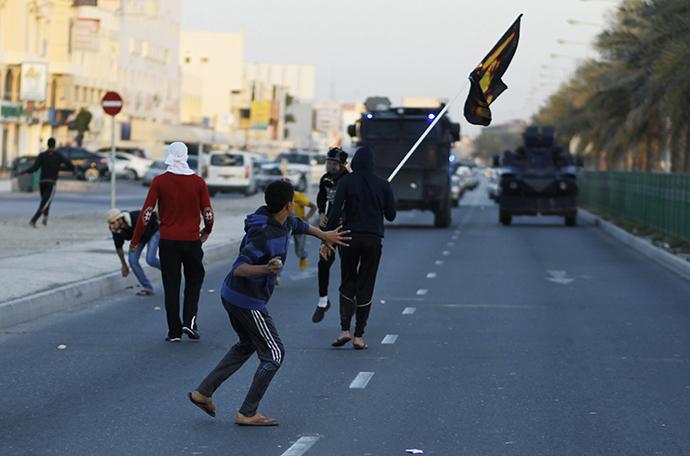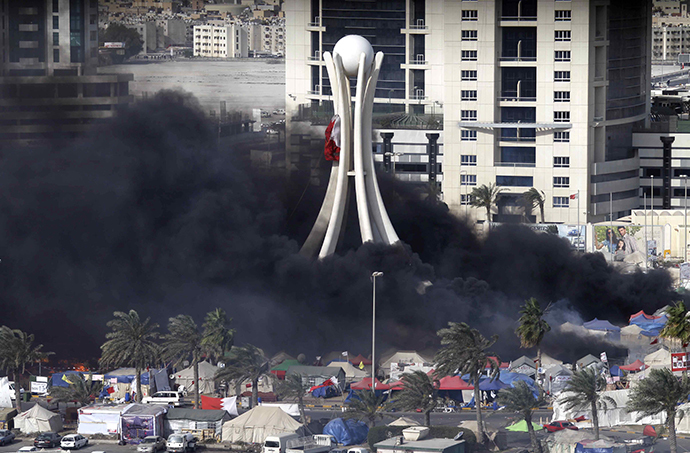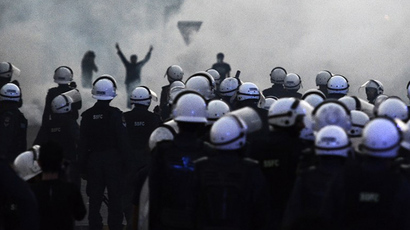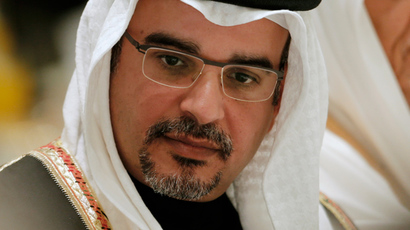Clashes, teargas mark third anniversary of Bahrain uprising
Clashes with police have marked the third anniversary of the Bahrain uprising that had seen numerous human rights violations by the government and wide social discontent of the majority Shia population with the minority ruling Sunni monarchy.
Police have used tear gas in a number of villages outside the
capital Manama across the small island nation as the security
forces moved in to disperse gatherings.
In some districts protesters have been setting barricades of
burning tires to prevent police from moving in. Protesters were
chanting "Down with Hamad", referring to the king and
"Only to Allah we kneel."
At least 29 people have been arrested during the clashes.
Some pictures of the unrest and the aftermath of police crackdown
were posted on twitter by Alwefaq National Islamic Society, the
main opposition party in Bahrain.
مرتزقة النظام تقمع تظاهرة في الدراز - 13 فبراير 2014م #Bahrainpic.twitter.com/grYEtLVO93
— Alwefaq Society (@ALWEFAQ) February 13, 2014
تظاهرات شهدتها قرية كرزكان في ذكرى انطلاقة الثورة البحرينية بحضور لافت #Bahrainpic.twitter.com/esuCACshD6
— Alwefaq Society (@ALWEFAQ) February 13, 2014
Thursday was the beginning of the three-day-long protest event
called by the 'February 14 youth coalition', the Shiite-led
opposition, to mark Friday's 3 year anniversary of the popular
protest.
Anti-government movement supporters were urged to once again
occupy the Pearl Square, the cradle of the revolution where
activists camped out in 2011 before the Bahraini, Saudi and UAE
troops smashed the uprising.
Fearing violent reprisals by the government, Amnesty
International issued a caution against violence at Friday’s
demonstrations.
“The anniversary’s protests are a test for the authorities to
demonstrate internationally that they are committed to protecting
human rights. They must allow the peaceful exercise of freedom of
expression, association and assembly and release all prisoners of
conscience,” said Said Boumedouha, Amnesty International’s
Deputy Director for the Middle East and North Africa.

Just this month the king of Bahrain signed a bill imposing a 7-year jail sentence and a fine of up to 10,000 dinars ($26,500) for those who insult him. This follows July’s measure of indefinitely banning demonstrations, sit-ins or public gatherings in the capital.
The Gulf Island, the base for the US Navy's Fifth Fleet, has faced increasing criticism over its human rights violation in the past three years, where at least 89 people have been since the launch of the uprising, according to the International Federation for Human Rights.
Following the immediate waves of unrest, in February and March
2011, the Bahrain Independent Commission of Inquiry (BICI) was
established by the King of Bahrain in June to investigate the
violence. In a 500 page report the probe recorded 46 deaths, 559
allegations of torture, including torture of children, and more
than 4,000 cases of employees fired for joining the protests.
BICI has also submitted a number of recommendations to ease
tensions.
“As yet, the authorities have failed to implement key
recommendations made by the Bahrain Independent Commission of
Inquiry (BICI) in 2011,” Amnesty International says.

Continuous violations of human rights through the arrests of
political dissidents, doctors, demonstrators, including children,
have been widespread throughout the 3 year old struggle. The
government also stepped up the arrests of many cyber activists.
Media outlets also witnessed a major crackdown both online and
offline.
Last month’s report issued by a Bahraini human rights body said
that 745 protests took place in December alone. The government’s
reaction to dissent, according to the study, included mass
arrests, including detention of 31 children. According to
Liberties and Human Rights Department in Al Wefaq Society, at
least 17 torture or ill treatment cases of the detainees were
reported.
On Thursday, Amnesty International again touched on the issue:
“The authorities’ relentless repression of dissent continues
unabated – with security forces repeatedly using excessive force
to quash anti-government protests,” said Boumedouha.
“Scores of people, including dozens of children have been
detained for participating in peaceful protests over the last
year. Many of them alleged that they were tortured in
detention.”
Delayed peace talks between the Sunni ruling family and the
Shiite opposition have recently revived but have not yet made
progress, as massive distrust reigns between the opposition and
Khalifa family.














